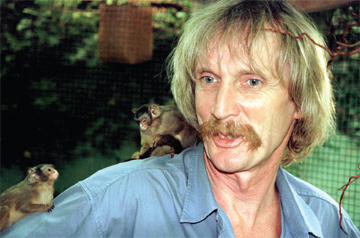Primatologist freed but questions remain for Brazil
Primatologist freed but questions remain for Brazil after “attack on science”
mongabay.com
August 8, 2007
While primatologist Dr. Marc van Roosmalen has been freed from prison pending appeal, prominent scientists had stinging criticism for the Brazilian government over its increasingly “hostile” treatment of researchers. Before Roosmalen was released Tuesday, some scientists even threatened “civil disobedience,” according to a report in the journal Nature.
Roosmalen, a naturalized Brazilian citizen, was charged with illegally housing wild monkeys at his residence and “embezzlement” in the form of trying to auction off the names of newly described monkey species and selling a scaffolding donated to the agency where he worked, National Institute for Amazon Research (INPA). In June this year he was sentenced to nearly 16 years in prison, a term that supporters said was far out of line with his alleged crimes.
In July a prominent group of scientists from the Association for Tropical Biology and Conservation (ATBC) fired back with a sharply worded statement on Roosmalen’s situation, but did not stop with his incarceration, going on to criticize the Brazilian government’s recent conduct towards academics and researchers.
“16 years is an excessive sentence for the infractions mentioned, and, for a man of Dr. van Roosmalen’s age, temperament and condition is tantamount to a death sentence,” stated the petition issued by the scientists. “Scientists worldwide consider Dr. van Roosmalen’s indictment and sentencing as an attack on the practice and profession of biological science in Brazil, and as an attack on individual scientists.”

Photo of Dr. Marc van Roosmalen by E. Peres / A.P. |
“[We] request the Brazilian government… examine the relationship that this particular trial has to the current governmental limitations placed on scientists in Brazil,” continued the statement signed by 287 scientists. “At a time when ecological research is more critical than ever to enable the wise use and management of plants, animals and microbes in the world’s tropics, Dr. van Roosmalen’s indictment, trial, sentencing, incarceration and the associated media response is already discouraging biological research in Brazil, both by Brazilian scientists and by potential international collaborators. Dr. van Roosmalen’s situation is indicative of a trend of governmental repression of scientists in Brazil.”
In an op-ed published in Nature, scientists had more heated comments on Brazil’s restrictions imposed on scientists.
“Van Roosmalen is a specific case, within a broader context that is very sad for the country,” Leandro Salles of the National Museum in
Rio de Janeiro told Nature. “Under the current laws, researchers are treated as potential criminals.”
Scientists like Salles are increasingly vocal about growing restrictions on their work. Brazil says its actions are to combat “biopiracy” — according to Nature, Vanessa Grazziotin, the government prosecutor who led the inquiry into Roosmalen’s case, was reported as saying: “There is a vast biopiracy network infiltrating the research institutes.” Academics say the government has gone too far.
“Brazil has lost all kinds of money and intellectual importance because of its attempts to protect biodiversity from international interference,” Nature quoted INPA ecologist Philip Fearnside as saying.
“If there has been serious biopiracy in Brazil ever, I would be curious to know about it,” said another biologist.
The Roosmalen incident is not the first time scientists have been critical of the government’s actions. Also in July, researchers from the Smithsonian Tropical Research (STRI) revealed that the Brazilian federal agency SUFRAMA planned to allow settlers to colonize areas that have been monitored for more than 25 years as the one of the world’s most important and longest-running scientific experiments, the Biological Dynamics of Forest Fragments Project.
“The stakes are very high,” said William Laurance [interview with Laurance] of the Smithsonian Tropical Research (STRI) and a co-author of the paper. “It’s not just the fragmentation project that’s threatened but also other scientific sites operated by Brazilian and other organizations, as well as critical conservation areas in the region.”
A different approach
According to Nature, prior to Roosmalen’s release, some scientists were so “fed up” with the situation that they were considering “civil” action.
“One more letter of complaint, one more meeting in Brasilia isn’t going to change anything,” Salles says. “So there is now a group that is ready to propose more forceful political acts, which could include strikes or civil disobedience of another form.”
UPDATE ON ROOSMALEN: Marc Roosmalen is free and, according to a scientist who met with him Tuesday night in Manaus, looking “quite well.” He hadn’t been aware of the petition from ATBC scientists but appreciated the support.







